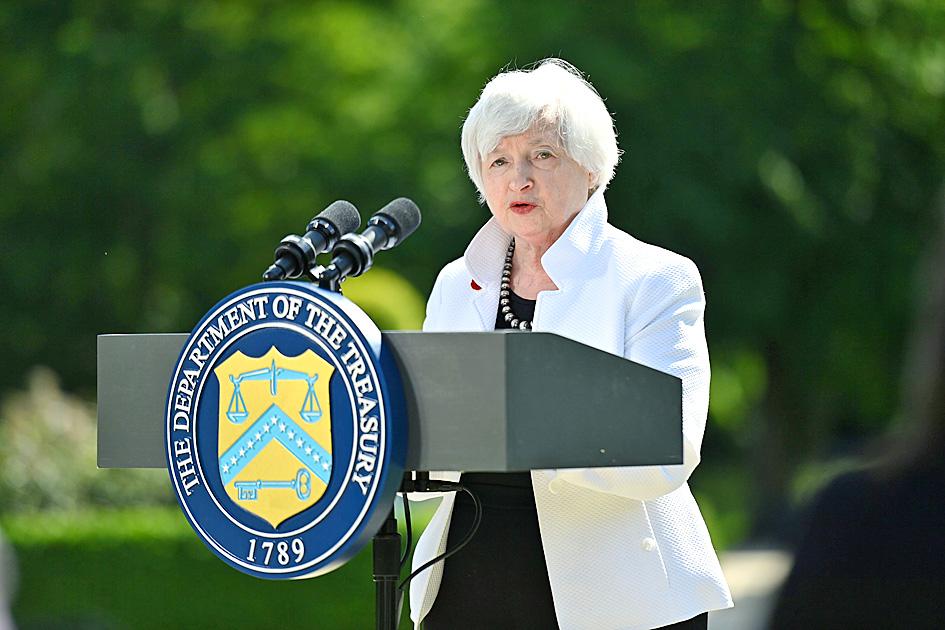US Secretary of the Treasury Janet Yellen on Sunday said that US President Joe Biden’s US$4 trillion spending plan would be good for the US, even if it contributes to rising inflation and results in higher interest rates.
“If we ended up with a slightly higher interest rate environment, it would actually be a plus for society’s point of view and the Fed’s point of view,” Yellen said in an interview with Bloomberg News during her return from the G7 finance ministers’ meeting in London.
The debate around inflation has intensified in recent months, between those like Yellen who argue that current price increases are being driven by transitory anomalies created by the COVID-19 pandemic — such as supply-chain bottlenecks and a surge in spending as economies reopen — and critics who say trillions in government aid could fuel a lasting spike in costs.

Photo: Reuters
Biden’s packages would add up to about US$400 billion in spending per year, she said, adding that it is not enough to cause an inflation overrun.
Any “spurt” in prices resulting from the rescue package would fade away next year, she said.
“We’ve been fighting inflation that’s too low and interest rates that are too low now for a decade,” the former US Federal Reserve chair said, adding that “we want them to go back to” a normal interest rate environment, “and if this helps a little bit to alleviate things then that’s not a bad thing — that’s a good thing.”
The headline measure of consumer prices rose 4.2 percent in the 12 months through April, and the numbers for last month are due to be published on Thursday.
The Fed has committed to only start scaling back the US$120 billion monthly pace of its asset purchases after there is “substantial further progress” on inflation and employment.
US job growth picked up last month — along with workers’ pay — and the unemployment rate fell to 5.8 percent, a US Department of Labor report on Friday showed.
Asian stock markets were mixed yesterday as investors mulled comments by Yellen on interest rates and weighed the impact of the G7 global tax plan on tech giants.
Hong Kong was down 0.7 percent, Sydney was off 0.2 percent and Taipei slipped 0.4 percent.
Tokyo trimmed earlier gains, but still closed up 0.3 percent, Seoul added 0.4 percent and Singapore was 0.7 percent higher, while Shanghai recovered from an early dip to end 0.2 percent higher.
Additional reporting by AFP

UNCERTAINTY: Innolux activated a stringent supply chain management mechanism, as it did during the COVID-19 pandemic, to ensure optimal inventory levels for customers Flat-panel display makers AUO Corp (友達) and Innolux Corp (群創) yesterday said that about 12 to 20 percent of their display business is at risk of potential US tariffs and that they would relocate production or shipment destinations to mitigate the levies’ effects. US tariffs would have a direct impact of US$200 million on AUO’s revenue, company chairman Paul Peng (彭雙浪) told reporters on the sidelines of the Touch Taiwan trade show in Taipei yesterday. That would make up about 12 percent of the company’s overall revenue. To cope with the tariff uncertainty, AUO plans to allocate its production to manufacturing facilities in

Taiwan will prioritize the development of silicon photonics by taking advantage of its strength in the semiconductor industry to build another shield to protect the local economy, National Development Council (NDC) Minister Paul Liu (劉鏡清) said yesterday. Speaking at a meeting of the legislature’s Economics Committee, Liu said Taiwan already has the artificial intelligence (AI) industry as a shield, after the semiconductor industry, to safeguard the country, and is looking at new unique fields to build more economic shields. While Taiwan will further strengthen its existing shields, over the longer term, the country is determined to focus on such potential segments as

TAKING STOCK: A Taiwanese cookware firm in Vietnam urged customers to assess inventory or place orders early so shipments can reach the US while tariffs are paused Taiwanese businesses in Vietnam are exploring alternatives after the White House imposed a 46 percent import duty on Vietnamese goods, following US President Donald Trump’s announcement of “reciprocal” tariffs on the US’ trading partners. Lo Shih-liang (羅世良), chairman of Brico Industry Co (裕茂工業), a Taiwanese company that manufactures cast iron cookware and stove components in Vietnam, said that more than 40 percent of his business was tied to the US market, describing the constant US policy shifts as an emotional roller coaster. “I work during the day and stay up all night watching the news. I’ve been following US news until 3am

COLLABORATION: Given Taiwan’s key position in global supply chains, the US firm is discussing strategies with local partners and clients to deal with global uncertainties Advanced Micro Devices Inc (AMD) yesterday said it is meeting with local ecosystem partners, including Taiwan Semiconductor Manufacturing Co (TSMC, 台積電), to discuss strategies, including long-term manufacturing, to navigate uncertainties such as US tariffs, as Taiwan occupies an important position in global supply chains. AMD chief executive officer Lisa Su (蘇姿丰) told reporters that Taiwan is an important part of the chip designer’s ecosystem and she is discussing with partners and customers in Taiwan to forge strong collaborations on different areas during this critical period. AMD has just become the first artificial-intelligence (AI) server chip customer of TSMC to utilize its advanced